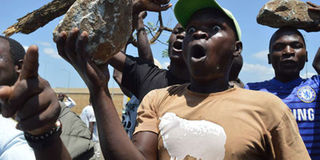Good politics, economics the answer

Kisumu locals demonstrate against the Supreme Court's ruling on the presidential election petition case, at Kondele on November 20, 2017. The interconnected nature of economic growth and political stability is unquestionable. PHOTO | ONDARI OGEGA | NATION MEDIA GROUP
What you need to know:
- Fiscal policy should aim at supporting rapid and inclusive economic growth.
- Policy makers and politicians who are supposed to act on well-intentioned advice may be part of the problem.
The Kenya Private Sector Alliance has put the economic loss due to the 2017 electioneering period at about Sh700 billion, while Treasury Cabinet Secretary Henry Rotich estimates it at one per cent of the GDP or between Sh120 and Sh130 billion.
The rarity of institutions agreeing on numbers, especially during an election year, is a conundrum that demands different evaluation.
Meanwhile, this sharp contrast has left many pondering the real outcome.
STABILITY
An outcome that would allow the country to disaggregate the real and potential economic implications of the 2017 elections vis a vis the economic fundamentals.
Both indicators place a premium on proper inquiry to deal with the conditions that produce economic and political instability.
The interconnected nature of economic growth and political stability is unquestionable.
However, debate rages on as to the biggest factor to the slowing economic growth.
GOVERNANCE
The separate politics and economy arguments may sound obscure, even technical, but history pundits say simply that both have to be addressed for prosperity.
Political stability in the context of growth should translate into a specific kind of stability: The rule of law, strong institutions, an efficient bureaucracy, low corruption, transparency and an investment enabling business climate.
The next government has its work cut out to improve economic conditions, and produce a viable plan to deal fully and effectively with the factors of political instability, including social inequality, national cohesion, mismanagement of public funds and extrajudicial killings.
POLICY
The pace of the economic process will be shaped by several main drivers.
Key is the combination of social investment spending and fiscal discipline.
Given the sensitive political environment, fiscal policy should aim at supporting rapid and inclusive economic growth.
The next determinant of outcomes will be confidence and credibility on policy and governance.
The challenge is to build on existing institutional strengths, create a new sense of direction and tackle the weaknesses.
INVESTORS
But it is difficult to see how in the aftermath of the prolonged electioneering this can be tackled without public and private collaboration and goodwill.
The trust and terms of public–private engagement will need to be reconfigured.
Winning investor confidence means both must align and offer a constructive path to improve market confidence.
Major lessons emerging from this period confirm what professors Daron Acemoglu and James Robinson explore in their classic study Why Nations Fail.
INSTITUTIONS
It is that promoting shared prosperity is a question of “good” economics, as well as “good” politics.
Policy makers and politicians who are supposed to act on well-intentioned advice may be part of the problem, and many attempts to rectify the situation backfire because checks and balances have been compromised.
Another key insight of the past year seems to be that even good institutions may work badly if compromised, wrong methods of procedure are followed, or if there is insufficient pressure for accountability.
Good institutions erode under the weight of corruption, ethnicity, and biased patronage.
VISION 2030
There needs to be widespread acceptance in Kenya that development without efficiency constraints cannot long endure, as such institutions and structures are inherently brittle.
The strength of the Vision 2030 plan is that it adopts a holistic framework about what needs to be done to get both the economics and the politics “right”.
We need to rediscover that message quickly.
REFORMS
Even though 2017 is cemented as a year of drawn political contests and turbulence, that does not mean it inevitably needs to inflict maximum collateral damage on the economy.
This can be achieved if Kenya can still demonstrate the necessary leadership that strengthens its credibility, makes progress with the implementation of promised economic and political reforms, promotes good governance and pursues policies that are clear, coherent and growth-oriented.
It is a tall order for the policy makers under the current circumstances, but it is what the country needs most if the economy is to regain its momentum sooner rather than later.
The margin for error has shrunk. Time is of the essence if certain economic costs and negative perceptions are not to metastasize through the economy.
That is the challenge that policymakers will need to address and it is paramount for all the leaders to see the sense of urgency, to act sensibly and to do so timely.
Mr Aludo is a strategy adviser. [email protected] Twitter: jeffaludo




